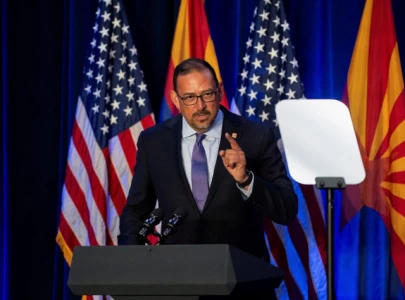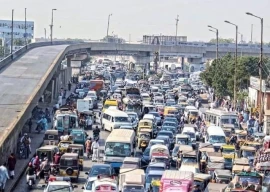n the dusty street of Hindu Para in Shireen Jinnah Colony, Haji Munawar and his six pupils passionately work over a new type of oil tanker which has never been made before.
Munawar, 55, boasts of his popularity among oil tanker owners from Karachi to Peshawar. Yet his success and future business prospects depend on the accomplishment of this type of tanker that he is working so hard on.
The new kind is being created with the purpose of smuggling Iranian oil from storehouses at the border of Iran to the depots inside Pakistani border.
"People connected with the business have started making this special tanker to transport the smuggled Iranian oil and it is not used for any other purpose," said Munawar. Currently, he is working on an order from a client in Quetta who wants two oil tankers with a capacity of 55,000 litres each. Moreover, he is on a deadline. He must make it ready and fix it on a 10-wheeler truck immediately after Eid.
This new kind of oil tanker has a great chance of generating huge profits for the oil smugglers as the Customs officials' indifference paves way for their illicit venture.
"As long as the officials at the border receive their Rs1,000 bribe, they will allow any kind of tanker to pass through," said Munawar. "It is simple. The smuggler has to pay the fixed rate, that is, Rs1,000 per vehicle and they [Customs officials] won't care about how many litres you are taking along. A thousand rupees per tanker will ensure you a smooth entry without considering whether your tanker is carrying 20,000 litres or 60,000."
The stringent checks imposed by the government on the transportation of Iranian oil have given birth to an increase in the amount of bribes that Customs officials can demand. The high risk involved is used by the officials to their benefit, said another body maker Mohammad Nasir. He works at his shop on Shireen Jinnah Colony Road and has completed two such tankers after Ramzan. Currently, he is working with his apprentices Humayun and Waseem on another one.
"Because of the government measures, drivers and tanker owners try to carry as much fuel in a single trip," he explained. "This has given birth to the need of making larger tankers for relatively small trucks."
Nasir was quick to wash away responsibility from his shoulders. "Right now, around six body makers are working on these tankers which directly go to Balochistan," he said. "Our job is only to make the tankers. It depends on the owner whether he uses them for water supply or for smuggling oil."
The make-up
The tankers are not made in accordance with the standards fixed by the oil marketing companies, that is, nine feet in height, 28 feet in length and nine feet in width. The metal sheets used in its manufacturing are the same as those used in any other oil tanker. The only difference is of the width and height.
To enhance the width and height of the tanker, its steel angle straps are welded not only on its interior but also on the posterior. The cost for this modification ranges between Rs580,000 to Rs600,000 while the time required to complete one such tanker is almost 15 days.
Unlike the 40-feet-long oil tankers of the Pakistan State Oil and other companies, these tankers do not need a separate body frame. They are more like water tankers, fixed with nuts and bolts in the trucks.
Protesting the wrong
All Pakistan Oil Tankers Owners Association is not happy with the production of these tankers as it would further increase the influx of smuggled Iranian oil which is impure.
"We have written to the Supreme Court and the Federal Board of Revenue several times for taking action against the smuggled oil as our vehicles worth millions of rupees are getting damaged by their impure diesel," said Shams Shahwani, a leader of the All Pakistan Oil Tankers Owners Association. "Around 90 per cent of the fuel stations are using the impure Iranian oil. This affects the engines and filters of our tankers which are worth millions of rupees."
Talking about the smuggling of Iranian oil into Pakistan, Shahwani said that nobody knows the exact quantity of oil being transported. "After the Hub accident, the business has become weak," he said. "But still, thousands of litres of petrol and diesel are being smuggled into Pakistan. No one has the exact figures about the amount as people are even transporting it on carts."
According to him, the border oil tankers only move in bordering areas transferring oil from depots [inside Iran] to depots [inside Pakistan]. Then the oil is transported to other parts of the country in different vehicles, he added. "Even passenger buses are used to carry this oil in plastic cans."
Published in The Express Tribune, October 12th, 2014.
COMMENTS (1)
Comments are moderated and generally will be posted if they are on-topic and not abusive.
For more information, please see our Comments FAQ






1727855843-0/Urvashi-(1)1727855843-0-270x192.webp)










Black racketeering a boon of enterprise for the black market, just who are the real beneficiaries ?